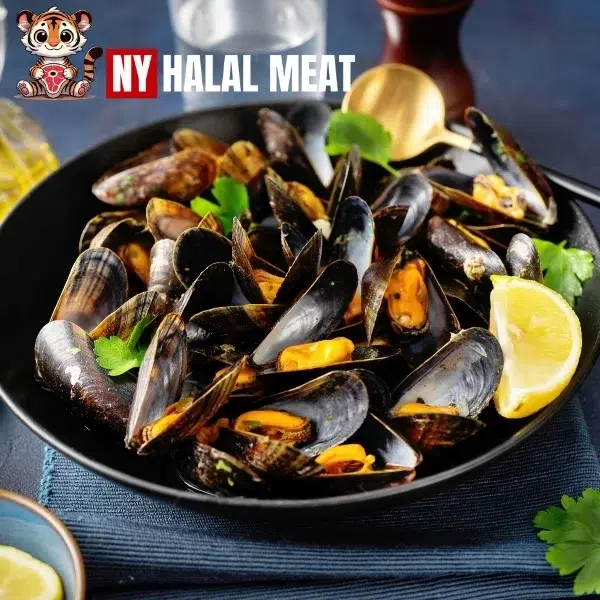Is Mussel Halal? A Comprehensive Guide for Muslim Consumers
Islamic Dietary Principles and Seafood: What Makes Seafood Halal or Haram?
Islamic dietary laws are deeply rooted in the Quran and Hadith. They provide guidelines on what is considered halal (permissible) and haram (prohibited). Seafood often occupies a unique space in Islamic jurisprudence, leading to varying scholarly views. NyHalalMeat offers halal-certified seafood options to support informed dietary decisions.
Scholarly Interpretations of Seafood in Islam: Where Do Mussels Stand?
Most Islamic scholars across the Shafi’i, Maliki, and Hanbali schools classify seafood as halal, including shellfish like mussels. However, the Hanafi school takes a more conservative approach, considering only fish with scales as halal. Since mussels are mollusks, their status varies depending on the school of thought.
What Are Mussels and Why Are They Popular in Global Cuisines?
Mussels are bivalve mollusks living in freshwater and marine environments. They have hard shells and soft edible flesh prized for taste and nutrition. They are often steamed or added to pasta or seafood stews and are enjoyed in Mediterranean, European, and Asian cuisines.
Hanafi School Perspective: Why Might Mussels Be Considered Makruh or Haram?
The Hanafi school maintains stricter rules about what qualifies as halal seafood. Because mussels lack scales and fall into the mollusk category, many Hanafis classify them as makruh (discouraged) or haram (prohibited), leading followers to avoid consuming them.
Shafi’i, Maliki, and Hanbali Perspectives: Broad Acceptance of Mussels as Halal
Unlike the Hanafi view, scholars from the Shafi’i, Maliki, and Hanbali schools adopt a broader interpretation of seafood permissibility. According to these schools, all sea creatures, including mussels, are halal. This view is widely followed in Southeast Asia and the Middle East.
Quranic Verses Supporting the Consumption of Sea Creatures Including Mussels
The Quran in Surah Al-Ma’idah (5:96) states, “Lawful to you is (the pursuit of) water game and its use for food.” Many scholars interpret this verse to include mussels, though school-specific rulings apply. Learn more about halal seafood from NyHalalMeat.
The Role of Halal Certification When Buying Mussels
Checking for halal certifications ensures proper sourcing, clean processing, and avoids cross-contamination with non-halal products. This is especially important for packaged or imported seafood. Always verify halal integrity with suppliers like NyHalalMeat.
Nutritional Advantages of Including Mussels in a Halal Diet
- High-quality protein for muscle repair and growth
- Rich in omega-3 fatty acids for heart and brain health
- Excellent source of iron, zinc, and vitamin B12 for energy and immunity
Including mussels, where permissible, enriches a balanced halal diet. Pair with halal meats from NyHalalMeat.
Sustainability and Ethical Factors in Mussel Farming
Mussels are natural filter feeders that improve water quality and offer a sustainable protein source. Farmed mussels have minimal environmental impact, making them an ethical choice for eco-conscious Muslim consumers.
Cultural and Regional Variations: Do All Muslim Communities Eat Mussels?
Some communities in Malaysia, Indonesia, and the Middle East commonly eat mussels. However, South Asian Hanafi-majority regions may avoid mussels due to stricter interpretations.
How Are Mussels Typically Prepared in Halal-Friendly Cooking?
- Steamed with garlic, onions, and herbs
- Cooked in tomato or coconut-based sauces
- Added to seafood rice dishes or pastas
- Grilled and topped with olive oil and lemon juice
Use halal-certified ingredients from NyHalalMeat for fully compliant recipes.
Cross-Contamination Concerns: What Should Muslim Consumers Know?
To avoid contamination from non-halal seafood, purchase from trusted suppliers, verify processing, and ensure clean handling. Check suppliers like NyHalalMeat for halal assurance.
Fatwas and Modern Scholarly Views on Mussels: Is There Consensus?
Many contemporary scholars permit mussels outside the Hanafi school. Some Hanafi scholars allow flexibility based on local customs and context.
Practical Guidelines for Muslim Consumers Considering Mussels
- Know your school of thought’s view
- Choose halal-certified sources like NyHalalMeat
- Verify clean processing
- Consult scholars if unsure
Frequently Asked Questions (FAQs) About Mussels and Halal Status

Q1: Are mussels considered halal for all Muslims?
A1: Not universally. Permissibility depends on the Islamic school of thought.
Q2: Can followers of the Hanafi school consume mussels?
A2: Generally makruh or haram in Hanafi jurisprudence, though some scholars are lenient.
Q3: Are farmed mussels halal if raised sustainably?
A3: Yes, if sourced ethically and contamination-free.
Q4: What health benefits do mussels offer?
A4: Rich in protein, omega-3s, iron, zinc, and vitamin B12, supporting heart and energy health.
Q5: How can Muslims ensure mussels are halal?
A5: Purchase from halal-certified suppliers like NyHalalMeat and verify processing.


